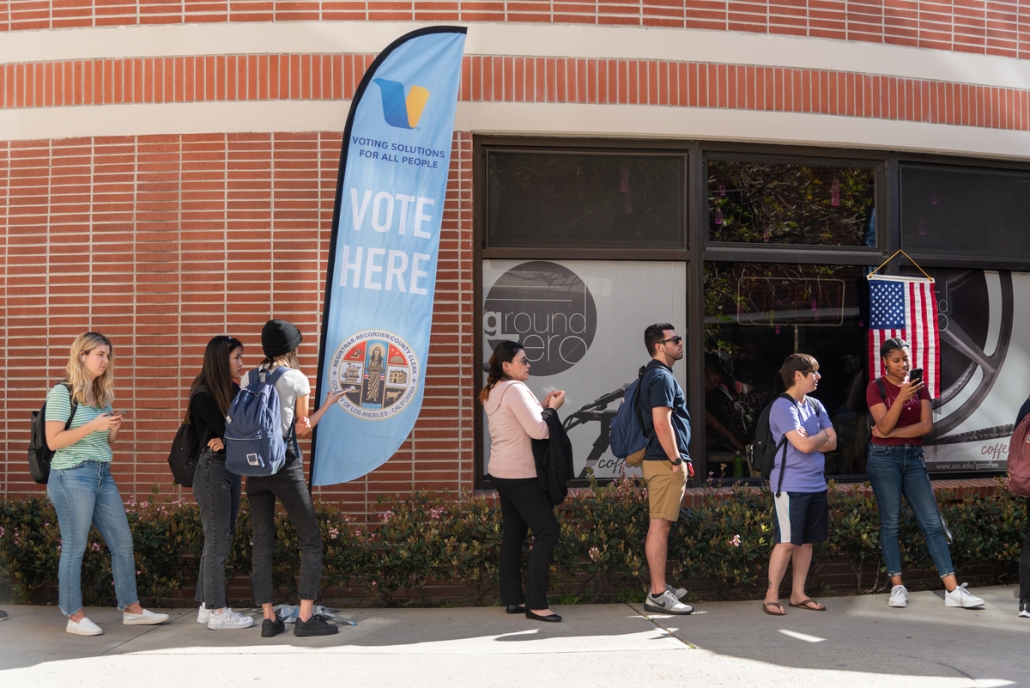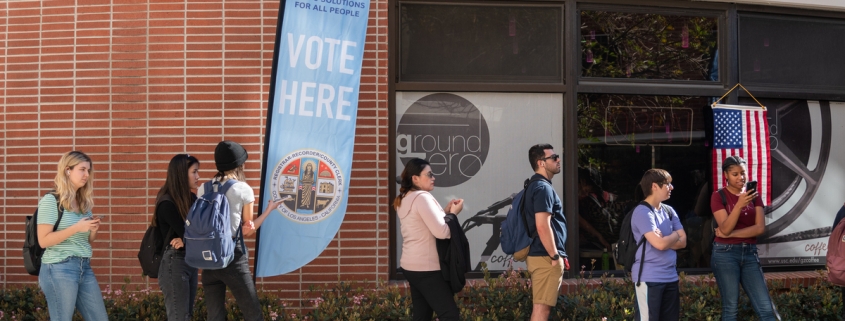Students take to the polls for Super Tuesday

Lines wrapped around Ground Zero Performance Café Tuesday as students stopped by the only voting center on campus to cast their ballots in the California primaries amid classes, work and extracurriculars.
Reminiscent of the enthusiasm evident among the USC community during the 2018 midterm elections, Ground Zero saw an increased number of student voters, leading to wait times of more than three hours. A few blocks away from the voting center, students on Trousdale Parkway ushered passersby to the polls, encouraging them to exercise their right to vote. After voting, some chose to gather in Wallis Annenberg Hall, anxiously awaiting the Super Tuesday results at the watch party event.
Super Tuesday marked a turning point in the 2020 primaries, as 14 states selected their Democratic nominee, securing nearly a third of delegates available in the election. Former Vice President Joe Biden swept up 10 of the states up for grabs, followed by Vermont Sen. Bernie Sanders who took the remaining four, including California, according to Associated Press projections.
These developments served as a surprise to some, including Ben Pearce, president of College Democrats.
“I think [Biden] definitely overperformed tonight. He won Minnesota and Oklahoma, two states that Bernie won in 2016,” said Pearce, a junior majoring in public policy, who attended the watch party hosted by the Dornsife Center for the Political Future and the Annenberg Center on Communication Leadership and Policy. “In Oklahoma, [Biden] was favored to win, but in Minnesota, Bernie Sanders was the heavy favorite. The story of the night is Joe Biden is probably the front-runner.”
Before Super Tuesday elections, former South Bend, Ind., Mayor Pete Buttigieg and Minnesota Sen. Amy Klobuchar suspended their presidential bids. Both endorsed Biden Monday along with former presidential candidate Beto O’Rourke. Pearce said he believes these last-minute endorsements are what led to Biden’s wins in the primaries by consolidating the moderate vote that would have been split if Klobuchar and Buttigieg stayed in the race.
“It consolidates all the moderate vote into one candidate, whereas the progressive vote is still being split into Warren and [Sanders],” Pearce said. “The only thing that could have gone better for Biden is if Mike Bloomberg had dropped out yesterday as well and endorsed him.”
At the time of publication, The New York Times reported Biden leading the count with 72 more delegates than Sanders at 356. Sanders had a delegate count of more than eight times that of Warren who followed at 35 delegates, ranking third. Warren won 22 more delegates than Bloomberg, a candidate who didn’t enter the race until November but swiftly moved up in the polls in the months following. One of the event moderators and CPF fellow David Hill said he believes this provides insight into the power money has in political campaigns.

“The people around Bloomberg, the political strategists, are smart people,” Hill said. “They’ve run hundreds of campaigns across America that you don’t even know about for congressional races and Senate races … These are skilled political operatives that had access to unbelievable, obscene amounts of money … This is going to have a sobering effect in the future of billionaires deciding to run for office.”
Nick Lopez, a senior majoring in cinematic arts, film and television production, said he was not surprised by Bloomberg’s voter turnout and believes it is a result of the money he has spent on advertisements. Since November, Bloomberg has spent more money on ads than all other candidates combined, including President Donald Trump, according to the Washington Post.
“The campaign system we have is basically advertising,” Lopez said. “People are allowed to invest like billions of dollars to advertise — it’s expected.”
Although Sanders received lackluster results than what was projected, Pearce said voters should not be discouraged and that it is imperative to keep supporting the candidate as the election cycle continues.
“It’s too close for us to give up,” Pearce said. “Even if tonight wasn’t a victory that we wanted, the fight is far from over. Especially people who love [Sanders], double down on your efforts to get him elected … Donate if you can, keep supporting [Sanders] because he’s got a shot to win it. Even if it’s not as big as a shot as it was just five hours ago. It’s still a shot, and it’s too soon to give up on it now.”
Joelle Ferguson, a senior majoring in public relations, who had to skip class to vote, said that for future elections USC should have multiple voting centers.
“I’ve seen students come to the line and then walk away, and that’s a potential voter leaving,” Ferguson said. “And it’s all because of the process and not so much as the person who wants to vote. And I think that’s the main issue … There’s just one voting place for three days. That doesn’t make sense.”
VoteSC co-president Eleonora Viotto said she was unimpressed by the state of the voting services throughout the past couple of days the center was open. L.A. County experienced technical issues at the Ground Zero voting center and other centers around the county because of an overload of voters.
Though 12 workers were expected to manage the polls, only four showed up, she said. Half of the 40 machines at the center were not set up and technological problems surfaced continuously throughout the three days of voting, slowing down the process.
Tuesday marked the first time USC opted for a digitized voting center, incorporating computers rather than paper ballots used at traditional polling places, said Viotto, a senior majoring in communication and political science. New to elections this year, the voting center also allowed same-day registration for California residents.
Natalie Oganesyan and Kate Sequeira contributed to this report.

